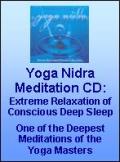|
|
Christian YogaChristian Yoga, Clergy,
and by Swami Jnaneshvara
Bharati Christians argue that Yoga is a religion Whether there is or is not such a thing as "Christian Yoga," it has become a quite controversial topic recently. Many so-called Yoga teachers claim that Yoga is just a physical fitness or alternative health program, and therefore has no conflict whatsoever with Christianity. Meanwhile, many Christians argue that Yoga is a religion and should therefore not be practiced in any form by the Christian faithful. Still other Christians bridge both of these views by creating a new category that they call "Christian Yoga."
Can a Christian
Practice Yoga? See also the article: Yoga and Christianity Yoga principles are contained within religions For thousands of years Yoga has been a universal process leading to subtle spiritual realization or direct experience, regardless of the religious orientation of the practitioner. Many of the principles of traditional Yoga are contained in the esoteric or mystical teachings of virtually all of the world's most known religions, including not only those of the South Asia region, but also those of the Judeo-Christian heritage. It has often and correctly been said that Yoga is in religion, but that religion is not in Yoga. Spiritual roots have been thrown out A big part of the confusion about Yoga and "Christian Yoga" stems from the fact that modern so-called Yoga teachers and their institutions, particularly in America, have significantly distorted or devolved the authentic, traditional Yoga of the sages. By attempting to reduce Yoga to a mere physical therapy or medical treatment, they have effectively thrown out the spiritual roots and goals of Yoga. The true goals of Yoga relate to kundalini and samadhi Modern Yoga styles and studios emphasize postures. The Sanskrit word for posture is "asana" and the root of that is "~as" which means "to sit." The Yoga Sutras (ca 2nd century BCE) is one of the most known of the ancient texts on traditional Yoga. According to the Yoga Sutras, asana or sitting posture is rung three of eight rungs of Yoga, and the purpose of that is meditation and the deep absorption known as samadhi, rungs seven and eight. The Hatha Yoga Pradipika (ca 15th century CE) is the most known traditional text that describes physical postures. Even a glancing overview of that text will quickly reveal the true goals of Hatha Yoga as also being the awakening of the subtle energy known as kundalini, and the subsequent experience of samadhi. Christian opposition to Yoga effectively promote Yoga Ironically, it is the Christians opposed to Yoga who seem to indirectly be doing the most in the US to promote the truer meaning of Yoga, although it is self-evident that this is not their intent. Most of the Christian critics emphasize the orthodox or exoteric practices of their religion, and either fail to see, or are opposed to the esoteric or mystical roots of their own traditions. Because of this, they also either fail to see the utility of traditional Yoga for their adherents, or are opposed to it. While they are wrong in saying that Yoga itself is a religion, they are most definitely right in pointing out the spiritual goals of Yoga.
Opposition to Yoga should be appreciated The Christian clergy and the followers of Christianity who are most outspoken against either Yoga or "Christian Yoga" need to be acknowledged and appreciated for doing so much to promote authentic, traditional Yoga. They are quite blunt in their descriptions of how Yoga is a spiritual practice. While they make the mistake of saying that Yoga is a religion, which it is not, Yoga is most definitely spiritual in nature. Even the proponents of "Christian Yoga" are effectively promoting the authentic spiritual goals of traditional Yoga by virtue of the fact that they are attempting to create an alternative Yoga, which clearly has a spiritual orientation, although theirs is in the context of a specific religion, unlike traditional Yoga. The continued efforts of the Christian clergy opposed to traditional Yoga, as well as both the advocates and opponents of "Christian Yoga" will bring many fruits for the Yogis and mystics within all of the religions active in America. Their efforts will continue to make it evermore clear that Yoga truly has to do with mystical, spiritual realization, something for which many people have a persistent yearning and cannot find in their institutional religions, "Christian Yoga" classes, or modern so-called Yoga studios. Though not their intent, their convictions will continue to lead many sincere seekers of direct experience to the authentic, spiritual methods of traditional Yoga. Opposition to Christian Yoga From the Hindu American Foundation
-------
|
|
||||||||||

